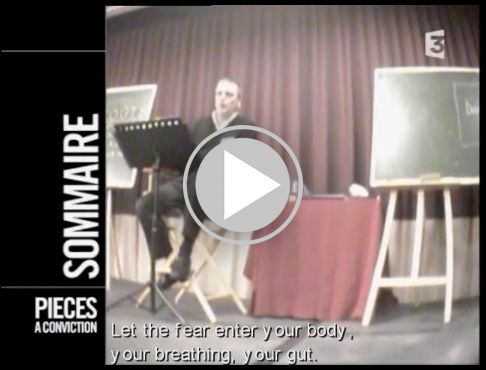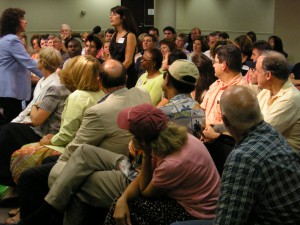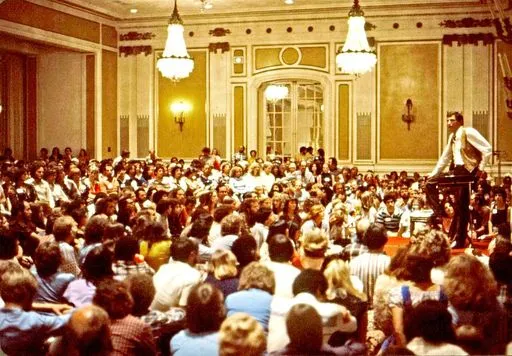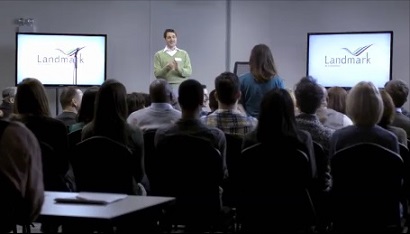My Dangerous Journey Through Landmark: Eye-Opening or Eye-Rolling?
Have you ever signed up for something thinking it might just be the thing that changes your life?
That’s where I found myself a few years ago when I first heard about the Landmark Forum.
Everywhere I turned, people were raving about it—how it helped them find clarity, reconnect with family, and even achieve success in ways they hadn’t imagined.
At prices starting today at $895 for three days and a evening session, it felt like a steep investment, but hey, if it could deliver the kind of breakthroughs people were talking about, why not give it a shot?
So, I signed up. And the following is based on my own personal experience and research.
About Me
 My name is Kate Harris. I’ve been a self-improvement junkie since I was a teen.
My name is Kate Harris. I’ve been a self-improvement junkie since I was a teen.
While others where sneaking romance novels under their covers I was reading books like “Do What You Love and the Money Will Follow” and “Acres of Diamonds”.
When Kindle came out with digital books, I was like a kid in a candy store.
Today I have an obscene amount of self-improvement books on my Kindle – and yes I’ve read them all.
As I got older, I started attending self-improvement seminars. And I started blogging about my experiences.
Now even though I’ve gotten lots of complimentary invitations to these seminars I always pay my own way to maintain my unbiased approach.
A Must Watch Video
But before I share MY experience, I want to share a video that was nearly lost in the passage of time.
This video – created by a team of French investigative journalists – caused shockwaves.
The investigators infiltrated a Landmark Forum session in Paris and for the first time, you can actually see what goes on inside a session.
If you are considering attending a Landmark Forum program, I urge you to watch this video now before the lawyers demand it comes down:

My Weekend of Regret
Little did I know, what I’d encounter over those 40 hours would be intense, emotional, and sometimes downright troubling.
For every moment of inspiration, there were countless questions about what was really happening behind the scenes. By the end, I felt like I’d participated in something far more complicated than a simple self-improvement seminar.
So, let me walk you through my experience, peeling back the layers of Landmark and exploring whether it’s the transformative experience it claims to be—or something else entirely.
The Setup: A Room Designed for Control
I attended Landmark Forum at a live event. During Covid, they added video events.
Now, they’ve kept the video events, and you can only attend live events in certain cities. Most of my comments will apply to the video events as well.
The first thing you notice when you arrive at a Landmark Forum session is the setting.
Imagine a plain, windowless room. Rows of chairs face a stage where the Forum Leader will spend hours pacing, instructing, and—let’s be honest—dominating the room.

This wasn’t some cozy retreat or a casual classroom. It felt sterile, clinical, and a little intimidating.
Before you enter the room, there is a “legal disclaimer form” you need to sign.
The bottom line is the goal of getting your signature is absolving Landmark if anything bad should happen to you.
Lawyers who have seen the form say it has zero validity but it may serve as a warning for what may happen.
Rules Designed to Cut Off the Outside World.
Then there were the rules: no phones, no texts, no recording, no taking notes, and minimal breaks.
Bathroom visits were discouraged, with the Leader occasionally calling out people who left during the session.
The idea, they said, was to stay present and fully engaged. But after several hours without stepping out for air, it began to feel less like focus and more like control.
The environment isolated us from the outside world, which, as I later learned, is a hallmark of Robert J. Lifton’s concept of milieu control. By cutting off distractions, Landmark ensured that we were entirely immersed in their reality.
Not having the ability to take notes, I was bored out of my mind during most of the weekend.
The Forum Leader – who had zero professional credentials – followed the plan exactly writing things on a blackboard. Eventually the blackboard was filled with meaningless jargon they tried to impress upon us as important.
Sharing: Courage or Coercion?
A huge part of the Landmark Forum involves sharing personal stories.
Early on, people were asked to stand up and speak about their struggles, regrets, or pain.
For some, this seemed cathartic—an opportunity to let go of long-held burdens. But the more I watched, the more it felt like something else was happening.
The Forum Leader didn’t just listen passively. They prodded, pushed, and challenged participants, sometimes in ways that felt aggressive.
One woman shared a heartbreaking story about her strained relationship with her ex-husband. Rather than offering support, the Leader questioned her role in the conflict, suggesting that her own behaviors were to blame.

It wasn’t just uncomfortable—it felt like public shaming dressed up as tough love.
The same woman was a glutton for punishment. She volunteered for everything. By Day 2 no one wanted to hear her stories anymore.
As the hours went by, people began to break down emotionally. Tears, trembling, and even outbursts of anger became common. The Leader would then swoop in, framing these reactions as part of the “breakthrough” process.
Watching this unfold, I couldn’t help but think about Lifton’s idea of confession. By encouraging (or pressuring) people to share their vulnerabilities, Landmark seemed to be breaking them down, leaving them open to the program’s influence.
And even worse, implying that only Landmark could fix them.
The Historical Roots: Landmark’s Link to est
One thing that helped me understand what I was seeing was Landmark’s history.
It turns out the Forum isn’t a brand-new concept—it’s a rebranding of something much older and far more controversial: Erhard Seminars Training (est).
Founded by Werner Erhard in the 1970s, est became infamous for its intense and often extreme methods.
Participants in est sessions were subjected to marathon meetings, public humiliation, and even verbal abuse, all in the name of self-transformation.

When est faced backlash, Landmark Education emerged as its successor (founded by Erhard’s brother), polishing the rough edges to appeal to a broader audience. The language became more corporate, the sessions less overtly hostile, but the core techniques remained.
The focus was still on breaking people down emotionally and rebuilding them within the program’s framework. Knowing this made me more skeptical of the breakthroughs Landmark promised.
After all, just because you rebrand something doesn’t mean you’ve changed its essence.
Education or Indoctrination?
One of Landmark’s big selling points is that it’s an “educational” organization.
They position themselves as teachers helping participants learn tools for personal growth. But as the seminar went on, I started to wonder: What kind of education discourages questions, limits critical thinking, and relies on jargon?
Words like “rackets” (Landmark’s term for self-defeating stories we tell ourselves) and “breakthroughs” (moments of transformation) were thrown around constantly.
These terms created a shared language among participants, but they also simplified complex emotions into bite-sized ideas.
It felt like what Lifton calls loading the language—reducing nuanced human experiences into programmed terms that everyone is expected to adopt.
The board at the front of the room rapidly filled with terms like “stories” and “rackets”. There literally wasn’t a square inch of free space at the board.
People were not shy during breaks. They took out their phones and took pictures of the boards perhaps to jog their memories.
When I looked at the board, I realized how much I had shut my brain down because half the terms on the board were meaningless.
The Leader at the Front of the Room
And then there was the Forum Leader. This person wasn’t a psychologist, therapist, or even an educator by training.

Yet they were treated as an authority figure whose methods weren’t to be questioned. When participants asked challenging questions, they were often met with deflections or vague responses, reinforcing the idea that the Leader—and Landmark itself—was infallible.
To be sure he was certain of what he was teaching but when someone came up to share, the fangs came out and no one was spared the withering criticism.
Here’s an excerpt from a lawsuit against Landmark Forum
However, Wofford is not without some merit. It held that a psychiatrist has a duty to exercise reasonable professional care in the discharge of a mental patient. While Defendant Landmark’s trainers were not psychiatrists, perhaps they should have been given the design of the Forum and its previous results found in some attendees. Nonetheless, Defendant Landmark employed a panel of psychiatrists to develop the screening program, which failed in either its application or design. Additionally, at the time of the graduation (which was the day before the death of Robert Jenkins), Defendant Weed demonstrated psychotic behavior that Defendant Landmark should have recognized as dangerous. (Source: Wikisource)
The Blame Game: When Self-Responsibility Goes Too Far
A recurring theme throughout the Forum (as in est) was self-responsibility. Landmark teaches that you are 100% responsible for your life.
At first glance, this idea sounds empowering. Who wouldn’t want to take charge of their destiny? But as the days went on, I realized this philosophy had a dark side.
By framing everything—your relationships, your failures, even your past traumas—as your fault, Landmark shifts all the blame onto you.
This perspective ignores external factors like systemic inequality, mental health struggles, or plain bad luck.
I couldn’t help but think about how this mindset benefits corporations and institutions. If you’re taught that all your problems are internal, why bother questioning the systems around you?
I saw this time and time again during the weekend. You’re telling your “stories”. You’re running your “rackets” on everyone.
Lifton’s doctrine over person comes to mind here.
Landmark’s ideology overrides the individual’s lived experience, dismissing anything that doesn’t align with their teachings.
It’s a convenient way to deflect criticism, but it doesn’t leave much room for nuance or compassion.
Cultural and Personal Values: A One-Size-Fits-All Approach
Another thing that struck me was how Landmark seemed to flatten everyone’s experiences into a single narrative.
The program assumes that its methods work for everyone, regardless of cultural background, personal history, or current circumstances. But life isn’t one-size-fits-all, and neither is transformation.
Even more troubling was the way Landmark framed traditional values.
Strong family ties, cultural practices, or religious beliefs were often portrayed as barriers to personal growth.
This felt especially problematic to me. Rather than helping participants integrate their personal growth into their existing lives, Landmark seemed to encourage allegiance to the program itself.
Religion Without Religion: The Spiritual Undertones
While Landmark doesn’t position itself as a religious organization, its sessions often felt like spiritual rituals.
The confession-like sharing, the cathartic breakdowns, and the emphasis on redemption all mirrored aspects of religious practice.
Even the final session, where participants bring family and friends to hear their breakthroughs, felt like a revival meeting.
Many business leaders have been impressed by the Landmark Forum and have tried to require employees to attend Landmark Forum training.
One such case was Café Gratitude in San Francisco. They required all new employees to attend the Landmark Forum. A few employees refused and were fired.
The employees won a lawsuit against the owners with a huge financial penalty. The owners shut down the business rather than pay the claim and drop the requirement to attend the Landmark Forum.
Lifton’s concept of mystical manipulation describes this perfectly.
Landmark frames its methods as a higher purpose, positioning itself as the key to unlocking participants’ potential.
It’s an attractive narrative, but it also subtly undermines existing spiritual or religious beliefs. It’s as if Landmark wants to become the central guiding force in your life.
The Price of Transformation
Let’s talk about money.
The $895 fee for the Forum is just the start. By Day 3 of the seminar, participants were being encouraged to sign up for advanced courses, which cost even more.
Then there was the push to recruit others.
We were asked to invite friends and family to the final session, not just to celebrate but to get them interested in joining Landmark.
It all started to feel less like self-improvement and more like a non-stop sales pitch.
And while Landmark insists that these programs are optional, the social pressure to keep participating—and spending—is hard to ignore.
Lifton’s dispensing of existence comes into play here: access to transformation is contingent on your continued involvement with (and financial investment in) the program.
The Risks: Emotional and Practical Concerns
One of my biggest concerns about Landmark was the emotional toll it took on participants.
I saw people break down in tears, confess painful secrets, and leave the room visibly shaken. And yet, Landmark doesn’t provide professional support for these situations.
There are no therapists on-site, no mental health screenings, and no follow-up care. For some participants, this could do more harm than good.
The liability waiver we signed at the beginning made it clear that Landmark takes no responsibility for any adverse effects.
That left me wondering: if a program is truly transformative, shouldn’t it also be responsible for the well-being of its participants?
Final Thoughts: The Fine Line Between Help and Harm
Looking back, my time at Landmark was a mix of curiosity, discomfort, and hard questions.
While I saw people genuinely moved by their breakthroughs, I couldn’t shake the feeling that the program relied too heavily on manipulation and control.
It’s not that personal growth isn’t possible—it’s that Landmark’s approach often feels more like indoctrination than education.
If you’re considering Landmark, my advice is this: don’t do it. There are other far better personal change programs to attend.
If you are curious as to the number one personal change seminar I’ve attended, you can see it here.
